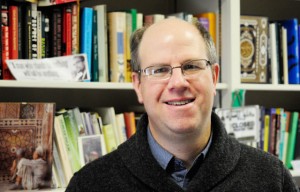Gottschalk writes on Islamophobia, Homophobia and Orlando

In the wake of the unparalleled homophobic violence committed in Orlando this month, and the Islamophobic and anti-Muslim sentiments expressed only hours later (notably, by presidential candidate Donald Trump), Professor of Religion Peter Gottschalk writes an op-ed for Inside Sources about the deep roots of all three in America.
He opens on a personal note: “As a boy in the late 1960s and 1970s, I knew there were few more destructive suspicions that could be voiced about me than those connoted by the label ‘gay.’ While the term might be flung at someone by friends as a joke, it could be a damning adjective if antagonistically and permanently attached to one’s name. […] Meanwhile — in an era that extended through two Israeli-Arab wars, the OPEC oil embargo and the Iranian Revolution — Middle Eastern politics reinforced longstanding American antipathies toward Arabs and Muslims. I grew up with the impression that all Muslims were Arab, violent and non-American. Of what others did one hear?”
Gottschalk goes on:
Raised in the United States, perhaps (killer Omar) Mateen’s homophobia stemmed, at least in part, from the same fears from which mine did. However, it seems significant that his father reported that Mateen’s outrage was piqued recently when the killer’s 3-year-old son saw two men kissing. In addition to whatever childhood antipathies with which he likely grew up, his homophobic-fueled fury seemingly also fed on fears that public gay life represented a threat to his family, if not to society in general: attitudes still expressed by too many Americans.
It is here that the homophobia still sadly endemic in America intersects with an Islamophobia that also has a long history. Donald Trump lost no time connecting Mateen’s horrible violence to his demand that all Muslim immigration into the United States temporarily cease. His speeches repeat tired stereotypes debunked too long ago to be accidental.
The Republican presidential nominee consistently uses “Muslim” and “Middle Eastern” as interchangeable terms, even though the overwhelming majority of Muslims live outside that region, which is also populated by sizable Christian and Jewish populations.
And Trump loudly insinuates that Muslims should be suspect not only because, as immigrants from conflict zones, they might bring violence with them. In his statement about Muslim migrants on Sunday, he claimed, “And we will have no way to screen them, pay for them, or prevent the second generation from radicalizing.”
An uncritical audience would likely ask why — if the children of migrants might radicalize — might not the third, fourth or 10th generation do so? Are not nearly all Muslims therefore suspect?
Read more here.
Gottschalk is also professor of science in society.

